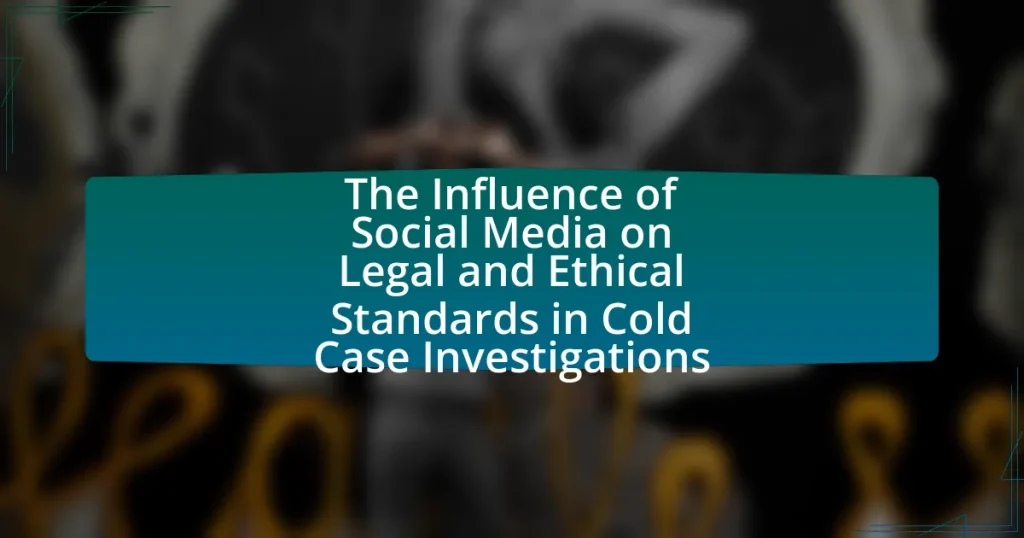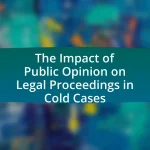The article examines the influence of social media on legal and ethical standards in cold case investigations. It highlights how platforms like Facebook and Twitter facilitate public engagement, allowing law enforcement to share details about unsolved cases and gather tips from the community. However, this increased interaction raises ethical concerns regarding privacy, misinformation, and the potential impact on ongoing investigations. The article also discusses the legal implications of using social media evidence, the role of public perception, and best practices for investigators to responsibly engage with the public while maintaining the integrity of their work.
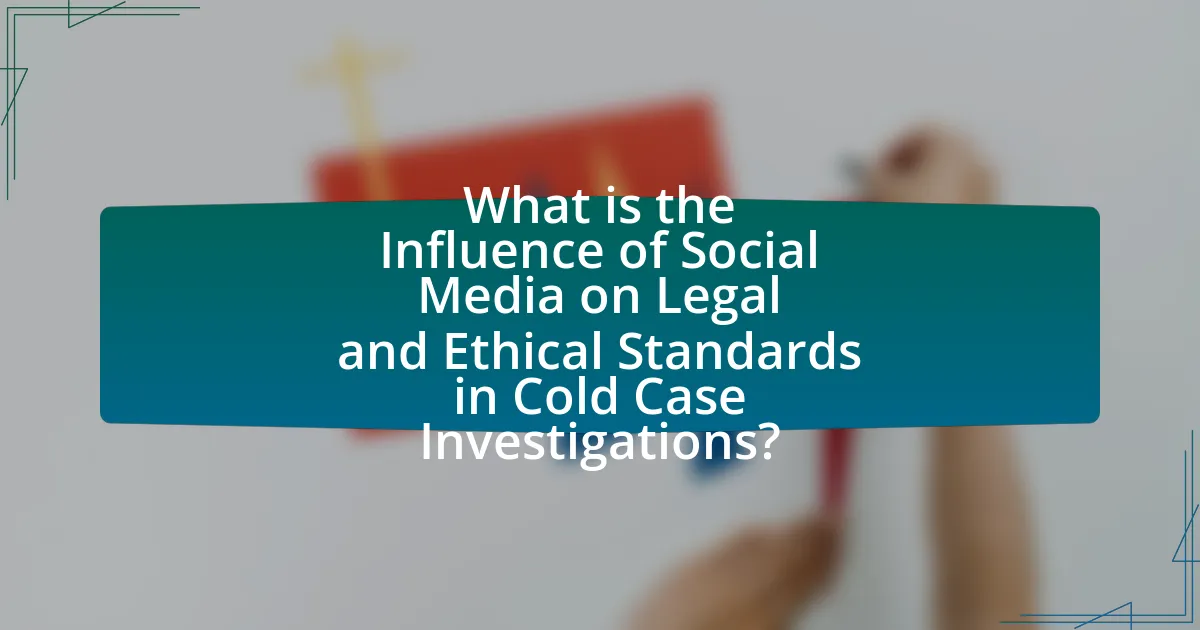
What is the Influence of Social Media on Legal and Ethical Standards in Cold Case Investigations?
Social media significantly influences legal and ethical standards in cold case investigations by facilitating public engagement and information dissemination. Platforms like Facebook and Twitter allow law enforcement agencies to share details about unsolved cases, encouraging community involvement and tips that may lead to breakthroughs. However, this increased public interaction raises ethical concerns regarding privacy, the potential for misinformation, and the risk of compromising ongoing investigations. For instance, the case of the Golden State Killer illustrates how social media can aid in solving cold cases while also highlighting the ethical dilemmas faced when sharing sensitive information.
How has social media changed the landscape of cold case investigations?
Social media has significantly transformed cold case investigations by facilitating public engagement and information sharing. Platforms like Facebook and Twitter allow law enforcement agencies to disseminate details about unsolved cases to a broader audience, increasing the likelihood of receiving tips and leads from the public. For instance, the case of the Golden State Killer saw renewed interest and eventual resolution partly due to social media campaigns that encouraged community involvement. Additionally, social media enables the rapid spread of information, allowing investigators to reach potential witnesses or individuals with relevant knowledge quickly. This shift has led to a more collaborative approach in solving cold cases, where community members actively participate in the investigative process.
What role does social media play in gathering evidence for cold cases?
Social media plays a significant role in gathering evidence for cold cases by facilitating the dissemination of information and encouraging public engagement. Law enforcement agencies often utilize platforms like Facebook, Twitter, and Instagram to share details about unsolved cases, which can lead to tips from the public. For instance, the case of the Golden State Killer saw a breakthrough when investigators used social media to connect with potential witnesses and gather new leads. Additionally, social media allows for the sharing of images, videos, and personal accounts that can provide crucial context or evidence that was previously overlooked. This interactive platform enhances community involvement, making it easier for investigators to gather diverse perspectives and information that may aid in solving cold cases.
How do social media platforms facilitate communication among investigators and the public?
Social media platforms facilitate communication among investigators and the public by providing real-time channels for information sharing and engagement. These platforms enable investigators to disseminate updates, solicit tips, and gather public insights on cold cases, enhancing community involvement. For instance, the use of Facebook and Twitter allows law enforcement agencies to reach a broader audience quickly, as evidenced by the successful resolution of cases through public tips generated from social media posts. According to a study published in the Journal of Criminal Justice, 70% of law enforcement agencies reported using social media to engage with the community, demonstrating its effectiveness in fostering communication and collaboration in investigations.
What are the legal implications of using social media in cold case investigations?
The legal implications of using social media in cold case investigations include potential violations of privacy rights, issues related to the admissibility of evidence, and the risk of influencing jury pools. Law enforcement agencies must navigate privacy laws, such as the Fourth Amendment, which protects against unreasonable searches and seizures, when accessing social media data. Additionally, evidence obtained from social media may face challenges in court regarding its authenticity and relevance, as established in cases like State v. McGowan, where courts scrutinized the reliability of social media evidence. Furthermore, public engagement on social media can inadvertently sway public opinion and affect jury impartiality, raising ethical concerns about the integrity of the judicial process.
How do privacy laws affect the use of social media evidence?
Privacy laws significantly restrict the use of social media evidence by establishing guidelines on data collection, consent, and the protection of personal information. For instance, the General Data Protection Regulation (GDPR) in Europe mandates that individuals must give explicit consent for their data to be used, which can limit law enforcement’s ability to access social media content without proper authorization. Additionally, the California Consumer Privacy Act (CCPA) provides similar protections, emphasizing the need for transparency and user control over personal data. These regulations ensure that while social media can be a valuable source of evidence in cold case investigations, any use of such evidence must comply with legal standards that prioritize individual privacy rights.
What legal challenges arise from social media interactions in investigations?
Legal challenges arising from social media interactions in investigations include issues related to privacy, admissibility of evidence, and potential bias. Privacy concerns emerge when investigators access personal information without consent, potentially violating laws such as the Stored Communications Act. The admissibility of social media evidence can be contested in court, as it must meet standards for authenticity and relevance, which can complicate its use in legal proceedings. Additionally, social media can introduce bias, as public opinion shaped by online interactions may influence jurors or investigators, undermining the fairness of the investigation. These challenges highlight the complex intersection of technology and legal standards in modern investigations.
What ethical considerations must be taken into account when using social media?
Ethical considerations when using social media include privacy, consent, and the potential for misinformation. Privacy concerns arise as individuals may inadvertently share sensitive information that can affect their safety or that of others. Consent is crucial, as sharing content involving other people without their permission can violate their rights. The spread of misinformation can lead to public panic or misinterpretation of facts, particularly in sensitive contexts like cold case investigations, where accuracy is paramount. For instance, a study by the Pew Research Center found that 64% of Americans believe that social media has a significant role in spreading false information, highlighting the need for ethical vigilance in content sharing.
How can investigators ensure they respect the rights of individuals involved?
Investigators can ensure they respect the rights of individuals involved by adhering to established legal and ethical guidelines throughout their investigations. This includes obtaining informed consent before engaging with individuals, ensuring confidentiality of sensitive information, and being transparent about the purpose of their inquiries. For instance, the American Psychological Association emphasizes the importance of ethical standards that protect individuals’ rights in research and investigations, highlighting the necessity of respecting privacy and autonomy. By following these protocols, investigators can maintain the integrity of their work while safeguarding the rights of those involved.
What ethical dilemmas can arise from public engagement on social media?
Public engagement on social media can lead to ethical dilemmas such as the spread of misinformation, invasion of privacy, and the potential for mob justice. Misinformation can distort public perception and influence legal proceedings, as seen in cases where false narratives gained traction online, impacting investigations. Invasion of privacy occurs when individuals share sensitive information about victims or suspects without consent, violating ethical standards of respect and dignity. Additionally, mob justice can arise when social media users collectively pressure law enforcement or target individuals based on incomplete information, undermining the legal process and due process rights. These dilemmas highlight the complex interplay between social media engagement and ethical considerations in legal contexts.
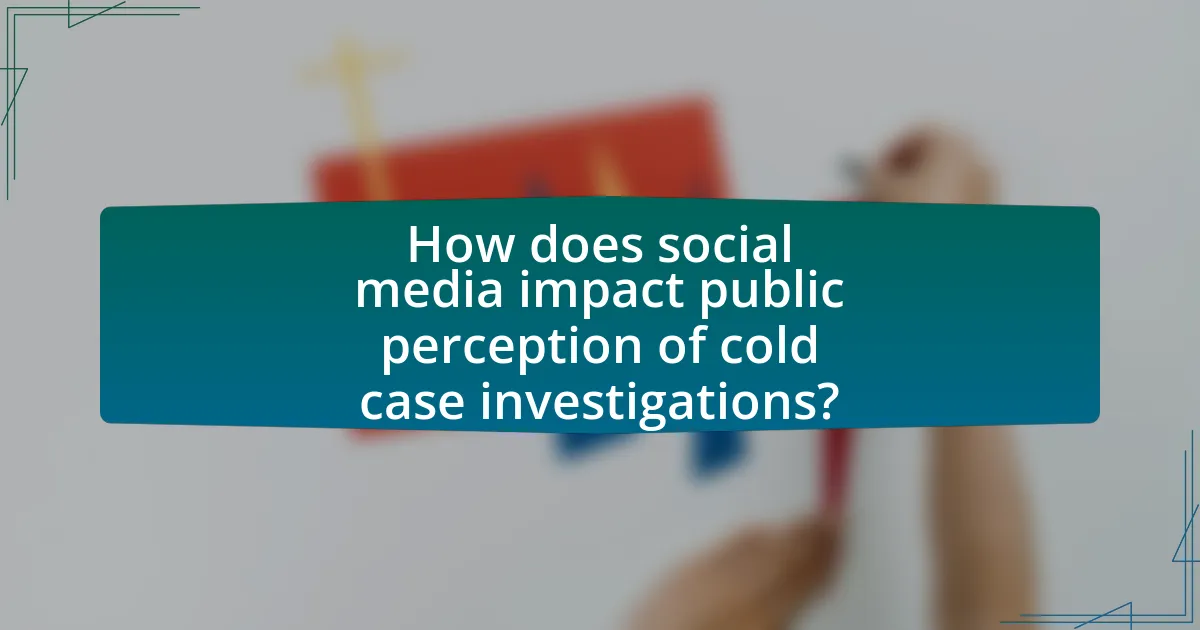
How does social media impact public perception of cold case investigations?
Social media significantly influences public perception of cold case investigations by increasing awareness and engagement with these cases. Platforms like Facebook and Twitter allow users to share information, theories, and updates, which can lead to heightened public interest and pressure on law enforcement to solve these cases. For instance, the case of the Golden State Killer saw renewed attention and eventual resolution partly due to social media campaigns that mobilized public support and shared critical information. This engagement can create a sense of urgency and community involvement, impacting how the public views the effectiveness and responsiveness of investigative agencies.
What influence does social media have on public interest in cold cases?
Social media significantly enhances public interest in cold cases by facilitating widespread awareness and engagement. Platforms like Facebook, Twitter, and Instagram allow users to share information, discuss theories, and mobilize community efforts, which can lead to renewed attention from law enforcement and media. For instance, the case of the Golden State Killer saw a resurgence in public interest and ultimately led to an arrest in 2018, largely due to social media campaigns that kept the case in the public eye. This demonstrates that social media not only raises awareness but also fosters a collaborative environment where the public can contribute to solving cold cases.
How can viral social media campaigns affect ongoing investigations?
Viral social media campaigns can significantly impact ongoing investigations by influencing public perception and potentially compromising the integrity of evidence. When a case gains widespread attention online, it can lead to a rush of public opinion that pressures law enforcement to act, which may result in hasty decisions or misallocation of resources. Additionally, the dissemination of unverified information can create misinformation, complicating the investigative process. For instance, in the case of the 2013 Boston Marathon bombing, social media played a dual role by aiding in the identification of suspects while also spreading false accusations against innocent individuals, which hindered the investigation. This illustrates how viral campaigns can both assist and obstruct law enforcement efforts, highlighting the need for careful management of information in high-profile cases.
What are the risks of misinformation spreading through social media?
The risks of misinformation spreading through social media include the potential to mislead public opinion, incite panic, and undermine trust in legitimate sources. Misinformation can lead to wrongful accusations in cold case investigations, as individuals may act on false information, potentially jeopardizing legal proceedings. A study by the Pew Research Center found that 64% of Americans believe that misinformation has caused confusion about basic facts, which can directly impact the integrity of investigations. Furthermore, the rapid dissemination of false information can create a distorted narrative that complicates law enforcement efforts and affects the ethical standards expected in legal contexts.
How do social media platforms shape the narrative of cold cases?
Social media platforms shape the narrative of cold cases by facilitating widespread public engagement and information dissemination. These platforms allow users to share details, theories, and updates about unsolved cases, often leading to renewed interest and pressure on law enforcement agencies. For example, the use of hashtags and dedicated groups can mobilize communities to advocate for justice, as seen in cases like the disappearance of Maura Murray, where online discussions have kept the case alive in public consciousness. Additionally, social media can influence the framing of narratives, as users may highlight specific aspects of a case, potentially swaying public opinion and impacting investigative priorities.
What role do influencers and public figures play in cold case discussions?
Influencers and public figures significantly amplify cold case discussions by raising awareness and engaging broader audiences. Their large followings on social media platforms enable them to share information, generate interest, and mobilize community involvement in unsolved cases. For instance, high-profile cases like the disappearance of Maura Murray have gained renewed attention through social media campaigns led by influencers, resulting in increased public tips and media coverage. This engagement can lead to new leads for law enforcement, as seen in various cases where public interest has prompted authorities to revisit evidence or conduct fresh investigations.
How can social media narratives impact jury perceptions in trials?
Social media narratives can significantly impact jury perceptions in trials by shaping public opinion and influencing jurors’ biases. Research indicates that jurors often access social media to gather information about cases, which can lead to preconceived notions that affect their impartiality. For instance, a study published in the Journal of Criminal Justice found that jurors exposed to negative social media narratives about a defendant were more likely to render a guilty verdict, demonstrating the persuasive power of online discourse. Additionally, social media can amplify sensationalized or misleading information, further distorting jurors’ understanding of the facts presented in court. This phenomenon underscores the critical need for legal systems to address the implications of social media on jury decision-making processes.
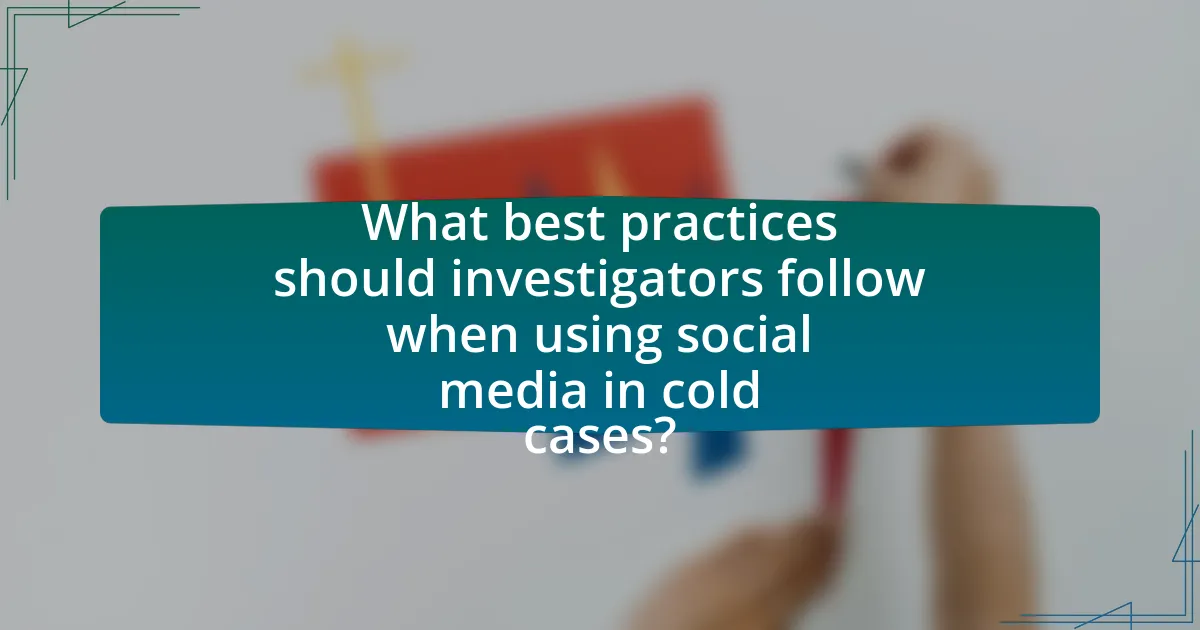
What best practices should investigators follow when using social media in cold cases?
Investigators should follow several best practices when using social media in cold cases, including verifying information, maintaining professionalism, and engaging with the community. Verifying information is crucial, as social media can spread misinformation; investigators should cross-check facts with reliable sources before acting on tips. Maintaining professionalism ensures that investigators uphold the integrity of the investigation and avoid compromising evidence or public trust. Engaging with the community can yield valuable leads, as many individuals may have information that can assist in solving the case. According to a study published in the Journal of Criminal Justice, social media can enhance community involvement in investigations, leading to increased tips and public awareness.
How can investigators effectively utilize social media for evidence collection?
Investigators can effectively utilize social media for evidence collection by systematically monitoring platforms for relevant posts, images, and interactions related to their cases. This approach allows them to gather real-time information, witness accounts, and potential leads that may not be available through traditional investigative methods. For instance, a study by the International Association of Chiefs of Police found that 80% of law enforcement agencies use social media to gather intelligence and evidence, highlighting its growing importance in modern investigations. By employing targeted searches and utilizing advanced analytics tools, investigators can enhance their ability to uncover critical evidence that may aid in solving cold cases.
What strategies can be employed to engage the public responsibly?
To engage the public responsibly, law enforcement agencies can utilize transparent communication, active listening, and educational outreach. Transparent communication involves sharing information about cold case investigations openly, which fosters trust and encourages public participation. Active listening allows authorities to consider community feedback and insights, enhancing the investigation process. Educational outreach, such as workshops or social media campaigns, informs the public about the legal and ethical implications of sharing information online, ensuring that engagement does not compromise ongoing investigations. These strategies are supported by studies indicating that community involvement can lead to increased tips and information relevant to cold cases, ultimately aiding in their resolution.
How can investigators verify the credibility of information sourced from social media?
Investigators can verify the credibility of information sourced from social media by cross-referencing the data with established facts and reliable sources. This involves checking the original context of the information, assessing the credibility of the user who posted it, and looking for corroborating evidence from reputable news outlets or official statements. For instance, a study by the Pew Research Center indicates that 64% of adults believe social media is a significant source of misinformation, highlighting the need for careful scrutiny. Additionally, tools such as reverse image searches can help confirm the authenticity of images, while fact-checking websites can provide verification of claims made in posts.
What tools and resources are available for managing social media in investigations?
Tools and resources available for managing social media in investigations include social media monitoring software, data analytics platforms, and digital forensics tools. Social media monitoring software, such as Hootsuite and Sprout Social, allows investigators to track conversations and gather relevant data from various platforms. Data analytics platforms like Brandwatch and Crimson Hexagon provide insights into trends and user behavior, which can be crucial for understanding public sentiment related to a case. Digital forensics tools, such as FTK Imager and EnCase, enable the extraction and analysis of data from social media accounts, ensuring that evidence is collected in a legally admissible manner. These tools collectively enhance the efficiency and effectiveness of investigations by providing comprehensive data management and analysis capabilities.
What software can assist in monitoring social media activity related to cold cases?
Hootsuite is a software that can assist in monitoring social media activity related to cold cases. It allows users to track mentions, keywords, and hashtags across various platforms, enabling law enforcement and investigators to gather relevant information and public sentiment regarding unsolved cases. Hootsuite’s analytics features provide insights into engagement and trends, which can be crucial for understanding community interest and potential leads in cold cases.
How can training on social media use improve investigative outcomes?
Training on social media use can significantly improve investigative outcomes by enhancing the ability of investigators to gather and analyze information from various online platforms. Investigators trained in social media techniques can effectively identify relevant data, track leads, and engage with communities that may possess critical information. For instance, a study by the International Association of Chiefs of Police found that 70% of law enforcement agencies reported improved case resolution rates after implementing social media training programs. This training equips investigators with skills to utilize advanced search techniques, understand platform-specific dynamics, and ethically engage with users, ultimately leading to more successful investigations.
What are the common pitfalls to avoid when using social media in investigations?
Common pitfalls to avoid when using social media in investigations include relying on unverified information, which can lead to misinformation, and failing to maintain privacy and confidentiality, risking legal repercussions. Investigators often encounter the challenge of misinterpreting social media content, as context can be easily lost, leading to incorrect conclusions. Additionally, neglecting to document social media findings properly can result in a lack of evidence integrity, undermining the investigation’s credibility. Lastly, engaging with subjects on social media can compromise the investigation and lead to ethical violations. These pitfalls highlight the need for careful, methodical approaches when integrating social media into investigative processes.
How can investigators prevent ethical breaches while engaging with the public online?
Investigators can prevent ethical breaches while engaging with the public online by establishing clear guidelines for online interactions and adhering to professional standards. These guidelines should include maintaining confidentiality, avoiding the dissemination of unverified information, and ensuring that all communications are respectful and professional. For instance, the International Association of Chiefs of Police emphasizes the importance of transparency and accountability in law enforcement communications, which helps to build public trust while safeguarding ethical standards. By following these protocols, investigators can mitigate risks associated with online engagement and uphold the integrity of their work.
What are the consequences of mishandling social media evidence in cold cases?
Mishandling social media evidence in cold cases can lead to significant legal repercussions, including the dismissal of evidence in court, which undermines the integrity of the investigation. When law enforcement fails to properly collect, preserve, or analyze social media data, it risks violating chain of custody protocols, which can render the evidence inadmissible. For instance, a study by the National Institute of Justice highlights that improper handling of digital evidence can result in lost opportunities for prosecution, as courts may exclude evidence that is deemed unreliable due to mishandling. Additionally, mishandling can erode public trust in law enforcement agencies, as communities may perceive a lack of professionalism and competence in handling critical evidence.
